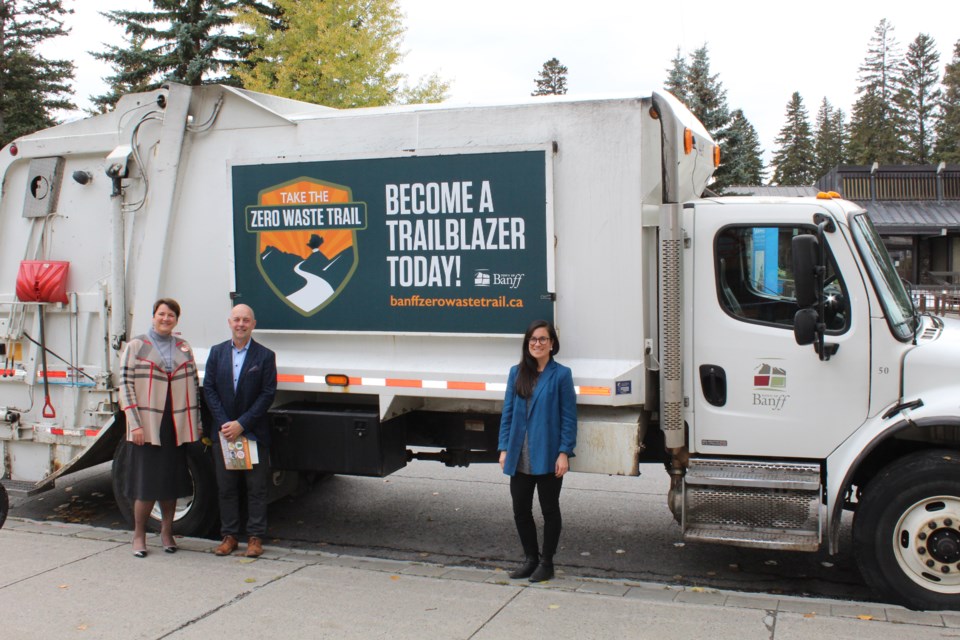BANFF – The Town of Banff has officially launched its commercial organic diversion program, as part of the municipality's goal to eliminate all waste going to landfills by 2050.
The Zero Waste Trail campaign is aimed at restaurants, hotels and other organizations and was touted by officials as one way for Banff to be a model environmental community.
"Many of you know we have been working on this for a while," said Mayor Karen Sorensen on Monday (Sept. 30). "The Banff environmental master plan and the Banff strategic plan, both adopted in 2019, identify this waste elimination goal and the milestones we need to achieve on the way
"But frankly the documents with their percentage targets and progress indicators, which is what we look at at the council table, they are not really great at painting a picture of the change that we need and the size of that change. The town, our municipal government, we cannot do this alone. We cannot meet these numbered targets without your help and we hope you will join us on the zero waste trail and paint a better picture of the change needed to keep us on the path to get there."
A waste characterization study of Banff's garbage found that 65 per cent of what get sent to landfills comes from non-residential sources – or in other words – businesses in the community. Of that, 50 per cent is food waste.
Sorensen said the first milestone will be to reach 70 per cent diversion by 2028, which means a reduction of 1,500 metric tonnes of food waste going to landfills. That would equal 166,666 full garbage bags, or enough garbage to fill 21 NHL size hockey rinks each year, said the mayor.
"That is how much garbage we have to stop from going to the landfill every year," she said. "When you think of the portion of all that garbage that is food waste, it is easy to see that we can make great strides toward the goal."
Sorensen said there is already environmental leadership being shown by the business community and she hopes that, and the cost savings that separating food waste will provide, encourages more commercial operations to get on board.
The Town of Banff's environmental coordinator Carla Bitz said businesses can sign up for a free assessment of their waste systems by the municipality, or register for the collection service. Once registered, businesses choose their bin size and determine how frequently the organic waste is picked up.
Bitz compared the 70 per cent diversion target as the first summit the community has to reach along the Zero Waste Trail.
"That first summit is really important and it is definitely achievable," she said, adding there are many businesses already stepping up to reduce organic material going to landfill. "For example, with business partners like Park Distillery, which introduced a new compost program this year and reduced food waste by approximately 50 metric tonnes annually."
The program also offers free follow-up solutions, tips on diverting waste and setting up the system, cost saving ideas, signage and tools for how to communicate with staff.
Executive director of the Banff and Lake Louise Hospitality Association Darren Reeder said the global tourism industry still has work to do when it comes to putting sustainability and waste diversion front and centre.
"As Canada's first national park, we have an opportunity, but more than that a responsibility to demonstrate how traveling down zero waste trail is part of a larger set of actions needed to adapt to the impacts of climate change.
"The Banff Lake Louise Hospitality Association's vision is that through the collective actions of our partners Banff National Park will be regarded internationally as a cradle of national park innovation in science, ecological management, climate change leadership and reconciliation with Indigenous peoples."
One way for that to happen, Reeder said, is for Banff to become known as the world's most sustainable high visited national park in the world.
in 2018, he said the hospitality association identified the need to take a comprehensive approach to identifying and reducing sources of single-use items as a starting point.
Sorensen referred to last Friday's (Sept. 27) climate action strike in the Bow Valley, across Canada and the world as a signal to all levels of government and community leaders that more action is needed to reduce greenhouse gas emissions.
"Make no mistake, the message was sent to people like me and people like you," she said. "It was a call to government at all levels and business leaders to do things differently to protect our environment and from my perspective, I think the loudest message we heard was do it now."
Email [email protected] or call 403-762-1132 for more information on how businesses can get involved in organic diversion.




